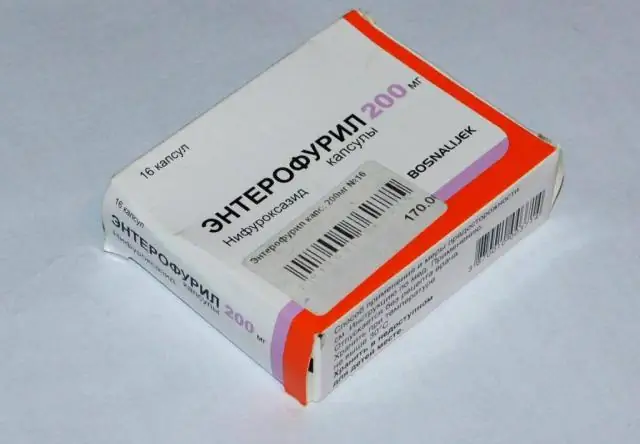- Author Rachel Wainwright wainwright@abchealthonline.com.
- Public 2023-12-15 07:39.
- Last modified 2025-11-02 20:14.
Erdomed
Erdomed: instructions for use and reviews
- 1. Release form and composition
- 2. Pharmacological properties
- 3. Indications for use
- 4. Contraindications
- 5. Method of application and dosage
- 6. Side effects
- 7. Overdose
- 8. Special instructions
- 9. Application during pregnancy and lactation
- 10. Use in childhood
- 11. In case of impaired renal function
- 12. For violations of liver function
- 13. Drug interactions
- 14. Analogs
- 15. Terms and conditions of storage
- 16. Terms of dispensing from pharmacies
- 17. Reviews
- 18. Price in pharmacies
Latin name: Erdomed
ATX code: R05CB15
Active ingredient: erdosteine (erdosteine)
Manufacturer: Medicom International s.r.o. (Medicom International sro) (Czech Republic)
Description and photo updated: 22.11.2018

Erdomed is an expectorant mucolytic drug.
Release form and composition
Dosage forms of Erdomed:
- capsules: gelatinous, hard, with a green lid and a yellow body, filled inside with a white with a yellowish tinge powder (in blisters of 10 pieces; in a cardboard box 1 or 2 blisters);
- granules for the preparation of a suspension for oral administration: white, free-flowing, small, with taste and a characteristic smell of orange (in bottles of 100 or 200 ml with a measuring cup included; in a cardboard box 1 set);
- granules for preparation of oral solution: white fine granular easily gliding powder with a characteristic lemon odor (in a sachet of 4.425 mg; in a carton box 10 or 20 sachets).
Composition of 1 capsule:
- active substance: erdosteine - 0.3 g;
- auxiliary components: magnesium stearate - 0.003 g; povidone - 0.008 g; microcrystalline cellulose - 0.01 g;
- capsule: indigo carmine - 0.000 092 g; iron oxide yellow - 0.000 759 g; titanium dioxide - 0.002 g; gelatin - 0.075 379 g.
Composition of 100 g of granules for preparation of oral suspension:
- active substance: erdosteine - 7 g;
- auxiliary components: orange flavoring - 1.5 g; sodium saccharinate - 0.4 g; aspartame - 1.6 g; sodium carboxymethyl starch - 6 g; sodium benzoate - 0.4 g; sucrose - 83.1 g
Composition of granules for preparation of oral solution contained in 1 sachet:
- active substance: erdosteine - 0.225 g;
- auxiliary components: lemon flavor, aspartame, sodium carboxymethyl starch, sodium benzoate, sucrose.
Pharmacological properties
Pharmacodynamics
Erdomed has a mucolytic and expectorant effect due to the pharmacodynamic effectiveness of its active metabolites.
The thiol groups of the metabolites serve to break the disulfide bridges that bind the fibers of glycoproteins, thereby reducing the elasticity and viscosity of sputum. Through this, erdosteine increases the efficiency of mucociliary transport in the lower and upper parts of the respiratory tract, improves the secretory function of the epithelium, accelerates and enhances the release of the respiratory tract from secretions.
Erdosteine through amine groups locally, antagonistically affects oxygen free radicals and in tobacco smokers prevents the suppression of alpha-1-antitrypsin, thereby reducing the damaging effect of tobacco smoke in chronic smoking. It also increases the concentration of immunoglobulin A in the mucous membrane of the respiratory tract in chronic obstructive respiratory diseases and reduces the suppressive effect of tobacco smoke on the function of granulocytes. Erdosteine, when combined with amoxicillin, increases its concentration in bronchial secretions, which results in a faster response to treatment in comparison with amoxicillin monotherapy.
On the 3-4th day of application, the therapeutic effect of Erdomed develops. Erdosteine does not contain free SH-radicals, so it does not damage the gastrointestinal tract, and the side effects from the digestive system do not differ from those with placebo.
Pharmacokinetics
The main pharmacokinetic characteristics of erdosteine:
- absorption: the substance is rapidly absorbed into the gastrointestinal tract; the maximum concentration in blood plasma (C max) is 3.46 μg per 1 ml; time to reach the maximum concentration (T max) - 1.48 h; area under the concentration-time curve (AUC) 0-24 hours - 12.09; C max and AUC increase against the background of liver dysfunction;
- distribution: 64.5% of the substance binds to blood plasma proteins;
- metabolism: rapidly metabolized in the liver to 3 active metabolites, the most important of which is N-thiodiglycolyl-homocysteine (metabolite 1 or M1); accumulation of metabolites can be observed in renal failure;
- elimination: the half-life (T 1/2) is> 5 hours; excreted through the kidneys and intestines in the form of inorganic sulfates; with severe liver dysfunction, T 1/2 may increase.
Pharmacokinetic parameters do not change with repeated use of erdosteine.
Indications for use
- acute bronchitis, laryngopharyngitis (acute inflammatory diseases of the respiratory tract);
- sinusitis, rhinitis;
- chronic bronchitis of smokers, including seasonal exacerbations, bronchiectasis, hypersecretory asthma, chronic obstructive pulmonary disease, chronic bronchitis (exacerbations of chronic respiratory diseases);
- exacerbation of bronchitis of bacterial origin (as part of complex treatment with antibacterial agents);
- pneumonia and partial atelectasis after surgery (for prevention).
Contraindications
Absolute:
- impaired liver function;
- renal failure with creatinine clearance (CC) less than 25 ml per minute;
- homocystinuria;
- phenylketonuria (granules for preparing a suspension and solution, since they contain aspartame);
- children under 2 years of age;
- individual intolerance to the components contained in the preparation.
Relative (diseases / conditions in the presence of which the appointment of Erdomed requires caution):
- liver failure;
- renal failure with CC more than 25 ml in 1 min;
- irrational combined reception with antitussives;
- pregnancy;
- period of breastfeeding.
Instructions for use of Erdomed: method and dosage
Capsules
Erdomed capsules are taken orally.
The recommended dose is 1 pc. 2-3 times a day.
Granules for preparation of oral suspension
The suspension prepared from granules is taken orally.
The recommended dose is 0.3 g (8.5 ml) or 0.01 g per 1 kg of body weight 2 times a day.
Erdomed's doses for children are determined depending on body weight and age, namely:
- 3-6 years old, weighing 15-20 kg: 2.5 ml 2 times a day;
- 7-12 years old, weighing 21-30 kg: 5 ml 2 times a day;
- from 12 years old with a weight of more than 30 kg: 5 ml 3 times a day.
To prepare the suspension, the contents of 1 bottle are poured with water up to a special mark. Then it is shaken thoroughly until a homogeneous suspension is formed. Next, it is important to check the level of the contents in the bottle and re-add water to the mark (if required) and shake. In finished form, the suspension can be used for 10 days (maximum) if stored at a temperature of 2 to 8 ° C (in the refrigerator).
Shake the bottle before each use.
Granules for preparation of oral solution
The prepared solution of granules is taken orally. To prepare the product, the contents of 1 sachet are dissolved in 1 glass of tea or water.
The recommended dose of Erdomed is the contents of 1 sachet 2-3 times a day.
Side effects
Possible adverse reactions (> 10% - very common;> 1% and 0.1% and 0.01% and <0.1% - rarely; <0.01% - very rare):
- gastrointestinal tract: rarely - diarrhea, nausea, heartburn; very rarely - change / loss of taste sensitivity (at the beginning of therapy);
- allergic reactions: rarely - urticaria, skin redness.
Overdose
There are no data on Erdomed's overdose.
special instructions
Erdomed is a source of homocysteine, and therefore amino acid metabolism may be impaired when diets are low in free methionine.
In cases where, during 5 days of drug therapy, the symptoms of the disease do not decrease or the patient's condition worsens, it is recommended to consult a doctor for advice.
Application during pregnancy and lactation
The embryotoxic effect of Erdomed was not revealed in preclinical studies, however, the experience of using the drug during pregnancy and lactation is limited. In this regard, the drug is prescribed with caution during pregnancy and during breastfeeding in cases where the predicted benefit to the mother outweighs the potential risks to the fetus or child.
Pediatric use
According to the instructions, Erdomed is contraindicated in children under the age of 2 years.
With impaired renal function
Renal failure:
- QC less than 25 ml in 1 min - use is contraindicated;
- CC more than 25 ml in 1 min - use with caution.
For violations of liver function
- impaired liver function: use is contraindicated;
- liver failure: use with caution.
Drug interactions
With the combined use of erdosteine with amoxicillin, the concentration of the second in the bronchial secretion increases.
Analogs
Erdomed's analogues are Elmucin, Mucitus, Abrol, Ambrobene, Ambroxol, Solvin, Fluimucil, etc.
Terms and conditions of storage
Store in a place protected from light and moisture at temperatures up to 25 ° C. Keep out of the reach of children.
Shelf life: capsules - 5 years; granules for preparation of suspension / solution for oral administration - 3 years.
Terms of dispensing from pharmacies
Dispensed by prescription.
Reviews about Erdomed
According to reviews, Erdomed is an effective mucolytic agent. First of all, patients recommend taking a drug to protect the respiratory tract from cigarette smoke. In this case, the therapeutic effect is often manifested already on the fourth day of treatment.
Among the shortcomings, the high cost of the drug is mainly indicated.
Price for Erdomed in pharmacies
Approximate price of Erdomed 300 mg capsules for 10 pcs. in the package - 307 rubles.

Maria Kulkes Medical journalist About the author
Education: First Moscow State Medical University named after I. M. Sechenov, specialty "General Medicine".
Information about the drug is generalized, provided for informational purposes only and does not replace the official instructions. Self-medication is hazardous to health!






